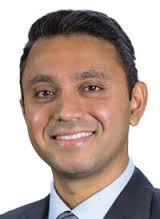08 Jun PD-L1 Agent Atezolizumab Effective in 25% of Metastatic Urothelial Cancers
MedicalResearch.com Interview with:

Dr. Arjun Balar
Dr. Arjun Balar MD
Assistant Professor, Department of Medicine
Co-Leader Genitourinary Cancers Program
NYU Langone Medical Center
Laura and Isaac Perlmutter Cancer Center
MedicalResearch.com: What is the background for this study?
Dr. Balar: Standard treatment for advanced urothelial cancer includes cisplatin chemotherapy. But more than half of patients are not expected to tolerate
it well and alternative treatment is inferior to cisplatin. The average survival for these patients is in the range of 9-10 months with carboplatin-based treatment, which is the most commonly used alternative
to cisplatin. Atezolizumab is a PD-L1 blocking antibody that reactivates
the body¹s immune system to fight bladder cancer and has been recently
FDA approved in the management of advanced urothelial cancer in the
second-line setting after failure of platinum-based chemotherapy.
MedicalResearch.com: What are the main findings?
Dr. Balar: The trial enrolled 119 patients who had not yet received any treatment
for advanced bladder cancer, but were considered ineligible for cisplatin
chemotherapy. In these patients, atezolizumab led to a 24% objective
response rate, and 7% complete response rate. Patients appeared to
benefit from treatment irrespective of the level of PD-L1 expression in
the tumor infiltrating immune cells. Further, at a median follow up of
14.4 months, 75% of the responses are still on-going and the estimated
median survival is 14.8 months, which compares very favorably to outcomes
we typically see in this patient population. Treatment with atezolizumab
was very well tolerated, with only 15% of patients developing grade 3 or
4 treatment-related toxicity and 6% of patients discontinuing treatment
due to toxicity. In contrast, roughly 20% of patients will discontinue
carboplatin-based treatment due toxicity. Further, immune-related
toxicities from atezolizumab treatment were manageable, with no patients
requiring anything beyond steroids to treat the side effect.
MedicalResearch.com: What should readers take away from your report?
Dr. Balar: Treatment with atezolizumab led to rapid and durable responses in nearly
a quarter of patients with metastatic urothelial cancer and treatment was
well tolerated. Further, the estimated median survival compares very
favorably to outcomes we typically see in this patient population.
Atezolizumab has the potential to become a new standard of care as
first-line therapy in cisplatin-ineligible patients with advanced
urothelial cancer.
MedicalResearch.com: What recommendations do you have for future research as a result of this study?
Dr. Balar: We will need to conduct a randomized study to definitively compare
atezolizumab to standard chemotherapy to confirm if our findings in this
trial are true. Further, we will need to also see if the findings in this
trial can support the use of atezolizumab as a treatment option for
cisplatin-eligible patients as well. These trials are currently being
designed.
MedicalResearch.com: Is there anything else you would like to add?
Dr. Balar::This is a very exciting time in urothelial cancer research and I am
confident that in the next several years with the advances in
immunotherapy treatments, we will be making even more strides in
improving outcomes for patients who are facing this dreadful disease,
while also improving upon the safety and tolerability of treatment
MedicalResearch.com: Thank you for your contribution to the MedicalResearch.com community.
Citation: Abstract presented at the 2016 ASCO meeting
Atezolizumab (atezo) as first-line (1L) therapy in cisplatin-ineligible locally advanced/metastatic urothelial carcinoma (mUC): Primary analysis of IMvigor210 cohort 1.
Abstract No: LBA4500
J Clin Oncol 34, 2016 (suppl; abstr LBA4500)
Author(s): Arjun Vasant Balar, Matt D. Galsky, Yohann Loriot, Nancy Ann Dawson, Andrea Necchi, Sandy Srinivas, Richard Wayne Joseph, Ulka N. Vaishampayan, Srikala S. Sridhar, David I. Quinn, Alexandra Drakaki, Ignacio Duran, Jonathan E. Rosenberg, Thomas Powles, Jean H. Hoffman-Censits, Na Cui, Sanjeev Mariathasan, Ann Christine Thastrom, Oyewale O. Abidoye, Dean F. Bajorin; Perlmutter Cancer Center, NYU Langone Medical Center, New York, NY; Icahn School of Medicine at Mount Sinai, New York, NY; Department of Cancer Medicine, Institut Gustave Roussy, Paris-Sud University, Villejuif, France; Lombardi Comprehensive Cancer Center, Washington, DC; Fondazione IRCCS Istituto Nazionale dei Tumori, Milan, Italy; Stanford University Medical Center, Stanford, CA; Mayo Clinic, Jacksonville, FL; Karmanos Cancer Institute, Detroit, MI; Princess Margaret Cancer Centre, Toronto, ON, Canada; University of Southern California Norris Comprehensive Cancer Center, Los Angeles, CA; Westwood Rheumatology, Los Angeles, CA; Hospital Universitario Virgen del Rocío, Seville, Spain; Memorial Sloan Kettering Cancer Center, New York, NY; Barts Cancer Institute, Barts Health, and The Royal Free London NHS Foundation Trust, London, United Kingdom; The Sidney Kimmel Cancer Center at Thomas Jefferson University, Philadelphia, PA; Genentech, Inc., South San Francisco, CA; Genentech, Inc., San Mateo, CA; Genentech, Inc., San Francisco, CA
Note: Content is Not intended as medical advice. Please consult your health care provider regarding your specific medical condition and questions.
More Medical Research Interviews on MedicalResearch.com.
[wysija_form id=”5″]
Last Updated on June 8, 2016 by Marie Benz MD FAAD
